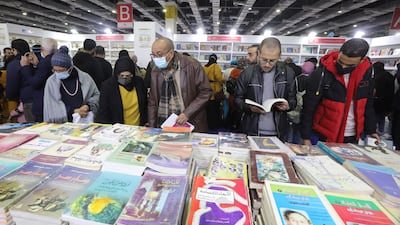The question of how to build the Arab book market has been vexing publishers for years.
Is it simply a case of supply and demand?
Or are wholesale changes needed, from publishing practices to new education policies, for the region to achieve its true market potential?
According to two seasoned publishers — Egypt’s Sherif Bakr and Lebanon’s Shereen Kreidieh — a combination of both is required.
Speaking during a panel at the Frankfurt Book Fair on Wednesday, the duo said the Mena region book market faces systemic and cultural challenges.
Bakr, general manager of Al Arabi Publishing and Distributing, says physical distribution remains a key stumbling block for the Cairo company.
"We are 100 million people in Egypt, so it's relatively not so big and not so small.
“But it is very difficult to send a book from Cairo to Aswan or Alexandria," he said in the session, organised by the Abu Dhabi Arabic Language Centre, part of the Department of Culture and Tourism — Abu Dhabi.
"We are not so sure that it will arrive because the postage system is not reliable and people don’t put in an accurate address.
“This is just the problem within Egypt. In other countries in the region, there are challenges with censorship and sometimes the freight fee is more than the price of the book."
That said, Bakr is heartened by some of the initiatives that have been created to ease such logistical concerns.
He pointed to the growth of print-on-demand services in the Gulf, such as Lightning Source Sharjah in Sharjah Publishing City, as an example of some of the solutions needed.
"Print on demand is becoming a hot topic in the Gulf and it may solve some of the problems related to distribution," he said.
"We have to continue finding different solutions because we can't go the same way we are going because we will only achieve the same results."
Knowing your audience
Are we placing too much of the blame on distribution?
According to Kreidieh, founder of children's publisher Dar Asala, many of her counterparts also have to shoulder some responsibility for why books, particularly Arabic children’s literature, are not flying off the shelves.
Kreidieh recalled a study she undertook with Abu Dhabi’s Zayed University, on award-winning Arabic children’s books, which found they were appreciated more by adults than the target audience.
“Isn’t part of the problem that children are not really enjoying reading because the material we are giving them is not what they like?" she said.
Bakr cited a former stint as the general secretary of the Egyptian Publishing Association, where a commissioned study by the organisation found a low interest in reading among Egyptian youth.
"And the reason for that is when they think of books, they think school books. So for them, reading was horrifying," he said.
"I remembered asking a young person if he was stuck in a room with only a book on the floor, would he read it? He said no."
Kreidieh, who also holds a degree in elementary education from the American University of Beirut, says part of the blame lies in a rigid education system practised across the region.
"In most of the Arab world, the curriculum is too condensed and there is a lot of work to do.
“While in other parts of the world, like in Finland for example, children have a lot of time to play, they have beautiful classroom libraries and easy access to books," she said.
"Some of these methods I try to teach at schools, but teachers say they have too much curriculum work to do.
“And children, with their assignments and book summaries, associate reading with punishment. It's not something they enjoy."
The future is bright
Despite some of the challenges facing the industry, Bakr is optimistic the region will eventually gain its place as one of the world’s biggest publishing markets.
"I really believe we are the next biggest thing after China," he said. "If you look at the Cairo International Book Fair, for instance, you will find that two million people visit each year and that’s only one city.
"So if you look at the greater region, even if it’s a small percentage of the population that are consumers, that will still be a relatively big number in Europe. But this takes time, of course.”
Kreidieh says she's seen that potential physically and online.
“When you go to the book fair in Cairo, it is beautiful because you find all these kinds of networks of people, from parents to influencers, coming together in one spot.
“Social media is also playing a bigger role because people read the book, love it and share it and people come to fairs and order them.”
While the future looks bright, Bakr encourages future authors to experiment with various story formats.
"Don't fight against it but play with it," he said.
"Create it in whatever way it will work and grab the attention of people. Good content will never die and it can be transformed in many ways."
The Frankfurt Book Fair runs until Sunday, October 23. More information is available at www.buchmesse.de


